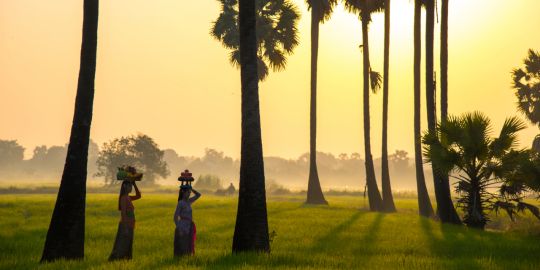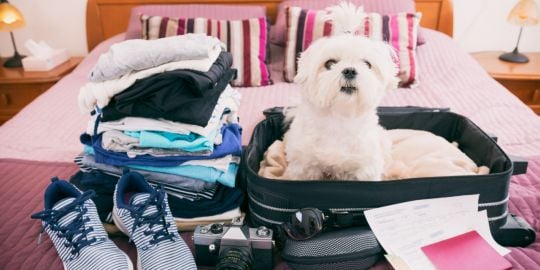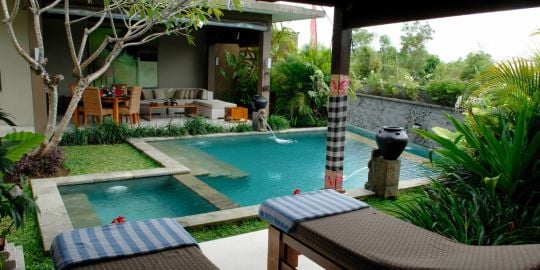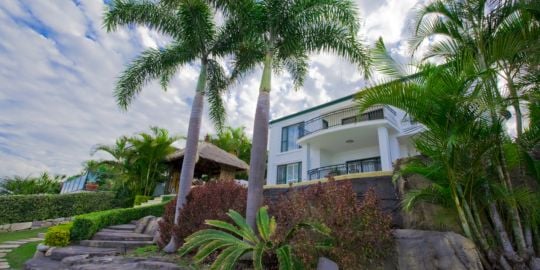Transport
Walking
Much of Indonesia doesn't have pavements (sidewalks) and the parts that do don't always look after them. Many pavements in cities are concrete covers over storm drains but with a lot of the covers broken or missing.
Where there are properly designed sidewalks, it's very common to see street hawkers take them over and blocking them totally.
You should be very careful when walking as there are many potholes so a twisted ankle awaits those who don't care care.
In traffic jams, it's very common for motorcyclists to use the pavement as well as the roads, and even pedestrian footbridges.
Where there is no pavement, Indonesians walk with traffic flow rather than against it, that leaving then vulnerable and at the mercy of drivers who might well be playing with their phones whilst driving (very common here). I strongly recommend walking towards oncoming vehicles and watching them very closely.
Crossing roads on foot is a dangerous affair as vehicles rarely give way for pedestrians and will usually ignore designated crossing, even light controlled ones.
Very busy streets often have people helping you across the road, the normal thing to do is pay them one or two thousand Rupiah.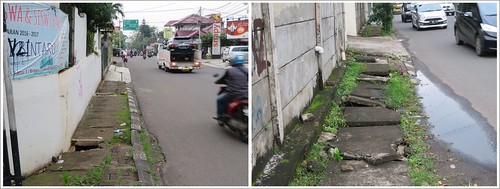
The roads
*************
WARNING - DO NOT DRINK AND DRIVE IN INDONESIA
This can get you a variety of punishments from fines, through prison time, to being beaten to death by an angry mob.
*************
Get a dashcam and make sure it's recording at all times.
If anyone is considering driving in Indonesia, watch this first.
These caused accidents but most get away with stupidity on the roads - I have no idea how they manage to, but they do.
These things are pretty common on roads here, especially the crazy overtaking and totally ignoring traffic lights..
http://www.youtube.com/watch?v=gpNJkfhaTCc
Most people have no idea how bad traffic is in Indonesia until they see it.
Traffic lights are advisory at best and commonly ignored; leading to total chaos.
http://www.youtube.com/watch?v=P-5QlRrMQfA
The lights were out of shot most of the time but they are there.
Red, green, whatever - no one much cares.
Most of the police corruption has been stamped out now but there's still some about so take a little care.
It is worth a note, any accident is your fault regardless of who is to blame, even accidents you witnessed but where not part of. Keep that dashcam running all the time so you have proof it was nothing to do with you. If your can picks up an accident, transfer the video to your phone or computer as soon as possible in case someone decided to blame you in the hope of getting some cash out of you - it happens.
Expect people to overtake you but turn left before they get clear or somebody to run a red light or just fly out a blind junction without a thought of looking to see if the road is clear.
Traffic lights are hardly ever bothered with in many placrs. They're there; just ignored.
Also note - Most people will turn left at any junctions regardless of light colour - this is accepted as normal here.
If there were any enforced speed limits (or even signs advising of a limit), speeding would be normal when you aren't in a traffic jam.
The idea of driving in Indonesia is; I'm first and I don't care about what's in the way or, if something is already there; it'll get out of the way.
They seem to think this applies to brick walls as I've seen on a couple of occasions.
The police do almost nothing to enforce any little rules so seeing a kid riding a motorbike, but unable to put his feet to the floor because he's only five years old, is pretty much normal in country areas.
A country area is anywhere there isn't a main road.
Because of this dangerous stupidity, illegal road humps are very common.
The locals get pissed off with the bad riding so install crazy road humps outside their house. This becomes more of a problem when the hump is so tall, the cars/bikes get stuck on them. This is quite common.
The other problem is, the locals all want a hump outside their house so humps just a few metres apart from each other is common.
Roads are commonly poor quality here, and road marking are often very confusing.
Watch this video of the road between Trisakti and the entrance to Jalan toll Tangerang.
The road markings are clear, warning of a bus lane, so you expect to move a lane to the left, but the toll road entrance is on the right before the bus lane, not marked until you getup to it.
A policeman awaits at that junction, looking for people who don't know the road.
There are plenty more junctions like this - so watch out.
The basic rule there is, don't cross a solid white line.
https://www.youtube.com/watch?v=tp5mEhUjSrs
Licences/insurance/Registration document + Tax
Licences
Your Australian/American/British licence isn't valid here and I expect that probably goes for most other foreign licences.
I believe (Open to correction). an international licence is valid if you report to your local POLDA.
Most cops will accept a foreign licence but don't get into an accident and try to use it. You may just get the wrong cop and end up with a very large bill to pay.
Local licences are:
SIM A - Car licence.
SIM C - Motorcycle licence.
Your licence MUST be carried whenever you drive or the vehicle can be confiscated.
These should be available, after passing a written test, driving test and medical, for a small fee.
The licence should be valid for five years. Most, but not all, of the corruption has been stamped out.
Update (21/09/17) - Foreigners must now take their tests at a POLDA, not any licencing centre as before.
Motorbike insurance.
Insurance for a bike is rare but you can get theft insurance if you try. Ask the dealer when you buy.
New cars on loans come with insurance but watch out to make sure third party is included. It will probably cost more and has limits for payouts.
New cars paid for in cash - ask to make sure insurance in included in the deal.
Car insurance
Insurance is a problem in Indonesia, especially when you look at motor insurance.
Most motorbikes have no insurance at all, and a large proportion of car drivers run around without it, not even third party.
Motorbike insurance against theft is easy enough for a new bike, but accident cover is pretty much impossible to get.
A new car always comes with insurance if it's on credit, but is optional for a cash sale.
You normally have to ask the dealer to arrange it for you.
Most car accidents are knock for knock, but make sure you're covered against some twit on a motorbike running into you and claiming you were at fault.
As I suggested before, a dashcam won't hurt in the event of an accident, but minor details such as clear proof won't always do much to help you.
Many policies don't have third party cover, so make sure you ask for it.
One bonus, many policies come with breakdown and recovery cover.
Registration document + Tax
Every vehicle must have a registration document, this being supplied with the owner's book when the car or bike is first issued number plates.
This document (SKNK) MUST be carried whenever you drive or the vehicle can be confiscated.
Every vehicle has to have a tax paid every year, this being at the end of the month noted on your registration plates (Plat polici).
The police sometimes do a 'sweeping' aiming for cars and motorbikes registered the month or two before the date of their operation.
Buying and selling vehicles
Buying a car/motorbike.
We need to get around, so many of us will buy a car and/or motorbike.
In general, a small scooter is easily the cheapest, most efficient and quickest in Indonesia's terrible traffic but, if you have a family or need a car for other reasons, you can legally buy one.
Buy a scooter that has space for your helmet under the seat - Very handy feature.
You'll get asked for your KITAS/KITAP when buying so the bike can be registered in your name.
Selling a car/motorcycle
All vehicles require taxing once a year, and that requires the person taxing the vehicle to take ID documents with them when they pay.
When a vehicle changes hands, the new owner should register the vehicle in their name, but that means a charge, and that doesn't go down well with a lot of people.
That in mind, expect the new owner to knock on your door at tax time, asking to borrow your ID card and/or various other documents, including passport and KITAS/P.
Whilst I see their position, this is illegal so you shouldn't do it.
Of course, there is no serious problem unless the vehicle is used in a crime or confiscated by the police for some reason.
I would strongly recommend you never lend documents to anyone, especially passport or immigration documents as there appears to be a serious black market trade in these things, with a western passport selling for several thousand US$, more than enough for the borrower to have 'lost' it out of his pocket on the way back to your house, if you ever see him again.
The best way is to make it clear the sale is final, and you won't help them tax the vehicle in future.
Transferring vehicles to another administrative area (Mutasi)
Cars and motorcycles are registered in the area you reside and all owners must pay a tax every year using the vehicle registration document (STNK) and your identification.
These must match so moving address outside that administrative area will mean you can't tax it.
That in mind, you have to transfer the vehicle and get new number plates. The rules are a bit of messing around and the police tend to make the job hard work, or maybe just make it sound hard.
I paid a cop to do the messing around for me, NOT a bribe, more a thank you for the hassle saved.
As I'd already found out the correct fee, I knew exactly how much he was charging me and decided it was a fair amount of money to exchange for a simple and easy life.
The procedure was done correctly, the appropriate officer checking my car exactly how he should (Including engine and chassis numbers) but I didn't have all the waiting around, running around, and headaches.
As long as you don;t expect any illegal service to be done for you, I don't really see a problem with this, more so as I asked a random traffic cop I met on the street.
Toll roads (Jalan tol)
The max speed for cars on most toll roads is 100kph - A good idea as the state of the roads and poor driving means any faster can be unsafe.
Important note - I have never used the Jakarta to Java toll road without seeing the results of a serious accident, usually a bus or a truck. A good few companies push their drivers to do long runs when tired, so they've been known to fall asleep at the wheel or just lose concentration and wander off the road.
Just this morning (27/6/18) a saw a bus on its side in the central reservation, passengers queuing up at an ambulance for treatment. The state of the bus suggested it crashed at speed so there's a fair chance there were serious injuries.
There are more and more toll roads in Indonesia, mostly in the Jakarta area, but a lot of new ones are being built around the country
Most are in pretty good condition, but some of the older ones can be a little rough.
All toll roads are cashless payments only so make sure you have an e-toll, brizzi, or Flazz, and make sure it's topped up. I have all three in anyway but I recommend you have two of the above in case one goes faulty.
There are staff around for drivers who get stuck.
Warning.
Many Indonesian drivers are poorly trained and have no training at all on fast roads, meaning they can be extremely dangerous.
Tailgating whilst flashing high beam is very common, even when you're stuck between two trucks and have absolutely no possibility to get out of the fool's way.
Don't get angry, simply ignore them and move over as soon as safe.
It's very common to see trucks and busses sitting in lane 2 and 3, jamming up the whole mess so always check out lane 1 as that's often totally clear.
Most Indonesians are unused to long roads so accidents are common on the tolls because they just can't handle the speed or try to drive too far without a rest.
Truck drivers are under pressure to get their deliveries completed so they tend to push themselves way too far, meaning you often see cars and trucks in the ditches at the sides of the road.
Watch out for other vehicles changing lane without warning, totally ignoring other cars to the side. They just don't check before moving lanes so be aware and stay safe.
Taxis
Jakarta has many taxi companies but you have to be a little careful.
Blue bird are reliable and, with two exceptions, have always got me there without messing about.
No tourist route, no attempts to run without using the meter and no messing about from the drivers.
Their drivers usually drive safely - mostly.
http://www.bluebirdgroup.com/passenger- … contact-us
Note - Every Blue bird driver must keep his car clean and tidy, and always have his ID badge in the front of the vehicle. They must return to their pool if they sustain any damage to their vehicle - Blue bird take safety and reputation very seriously.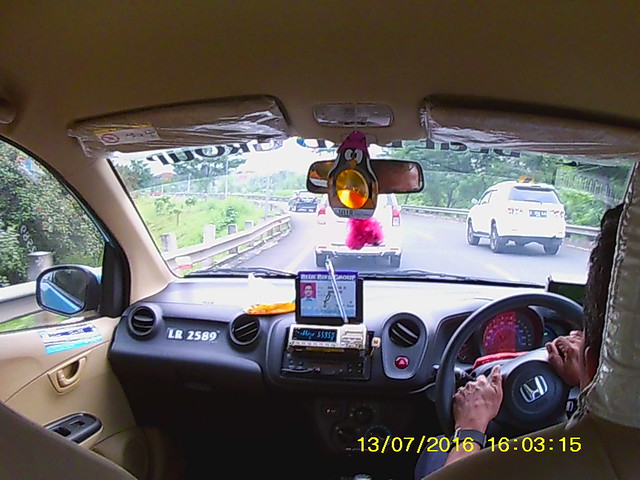
Silver bird is the top end posh service, running Mercs and other quality cars.
Their fares are about 1.5 times that of Blue bird.
Express are also generally good. Their cars, as with Blue bird, seem to be pretty well maintained and the drivers tend to be reasonable and honest.
Again, they always use the meter without being asked and, so far, they haven't messed about.
There are many other companies, many of which are probably fine but many are far less so.
I've seen rusty wrecks used as taxis and drivers I wouldn't trust as far as I could throw them.
However, I have used independents from time to time and some have been fine.
Purwokerto has two main taxi companies and both seem good.
As with all companies, there's a minimum fare.
I've never had problems with them.
Some tourist towns don't have taxi services, something that applies to many other less than busy towns in Indonesia.
Wonosobo now has a taxi service.[/b]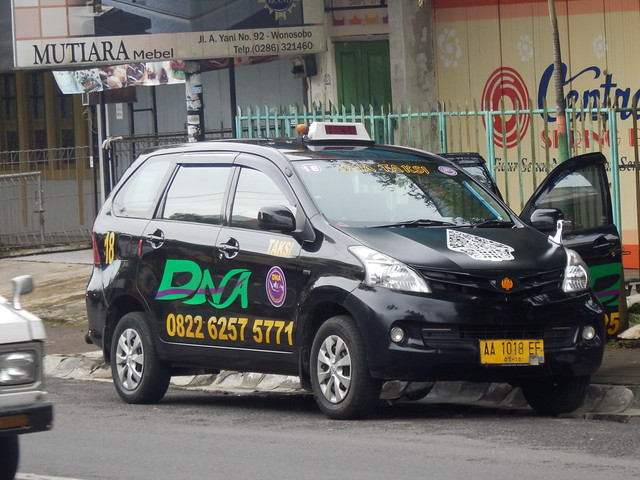
Perhaps other posters could PM comment on taxis in towns I haven't covered, and I'll add them to this with credit to the poster concerned.
I have, in over eight years of using Blue bird, had two really bad drivers. On both occasions I contacted to complain, sending map screenshots and maps and driver details (Photo of his driver card in the front of the taxi).
Their customer service rang me back in about 20 minutes.
You can't fault that, and that's why I continue to recommend Blue bird.
indostocks wrote:I think the best places for taxis generally is my hometown: Yogyakarta.
Taxis ALWAYS stick to the meter and never try to go the 'scenic' route. This is my experience of 10+ years. Of course some taxi drivers may be in a grumpy mood and give the silent treatment or may otherwise be uncommunicative. Some taxi drivers/taxi companies may insist on a minimum. Now in August 2013, this may be Rp 15000. You generally reach this fare in about 15 minutes anyway, unless you are stuck in traffic when it may take another ten minutes on top.
My favourite providers are Indra Kelana or ASA. Most of the others are almost as good. Cars tend to be new and clean. Few taxi drivers smoke as much as to stink up a car but if you have a problem then you can generally find another one reasonably quickly.
Gorontalo
No taxis except from the airport into town for Rp 75000 per person or Rp 300000 per car. Service is fast and efficient and I can recommend a gentleman by the name of Chandra for especially good service. Transport inside town is by "Bentor" for 2-3000 Rupiah short distance. This is like a motorcycle pedicab but very different from a Becak as in Jakarta.
Ubudian wrote:Taxis in Bali:
For taxis in Bali the most reliable and honest is Blue Bird, but here in Bali we have a lot of fake Blue Bird taxis running around so beware.
If you use the link below, the top photo is a real Blue Bird taxi, the one below it is a fake.
http://www.homeinbali.com/forum/uploads … 200374.jpg
Tips to spot a fake Blue Bird:
The roof ornament on a real Blue Bird Taxis is more angular and contains the Blue Bird logo whereas on the fakes, are more rounded in shape and contain a fake Blue Bird logo.
Fake Blue Birds commonly have various phone numbers on the back wind screen which are not to the Blue Bird dispatcher but rather to an independent dispatcher. The common fake phone number is 724724 but Ive seen other phone numbers employed.
App based taxis
App based taxis have set up business in Indonesia, charging lower fares for journeys under a private hire ideal rather than taxis. I have heard no complaints about their service from customers, but many officials and traditional taxi drivers don't like them.
The app based companies have been accused of data mining in the past, something you should be aware of when considering using their software.
Public transport (Not taxis)
Indonesia has a wide range of public transport.
Transjakarta is a public bus service that will take you to most areas of the city.
It has links to other bus services that can get you to the satellite towns around Jakarta.
They've has some issues with reliability of vehicles, including fires that have destroyed several buses.
However, in general they're safe and fast because they have special bus lanes that other drivers can't use with risking a fine.
More information on this thread.
https://www.expat.com/forum/viewtopic.p … 19#3396576
Lukereg wrote:For Transjakarta you need to buy a 40k flazz card which can be dropped up at the TJ bus stops.
You should always take the second bus that comes as Indonesians crowd onto the first thing that comes along leaving the next often empty.
Transjakarta route map
https://transjakarta.co.id/peta-rute/
Intercity bus services.
Indonesia has a lot of intercity bus services, both air conditioned and not.
The non AC are generally old, dirty cattle trucks I would strongly advise you not to even consider.
The Air conditioned buses are mostly pretty good.
I generally recommend Sinar Jaya services because their buses are clean, tidy and well looked after.
I strongly suggest buy two tickets because the seats tend to be a little cramped if you're big, or sit next to someone wider than average.
I have had a couple of overtired drivers, but they are generally safe.
You'll also notice the very cheap prices they advertise.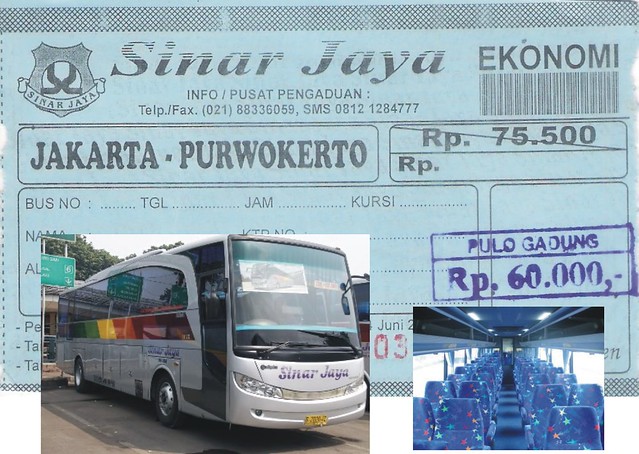
There are many local bus services, all about the same.
Their buses are commonly in poor condition and their drivers tend to drive in a fashion that leads you to suspect they're suicidal.
Kopaja buses in Jakarta are numbered and have designated routes, but are mostly old and commonly very overcrowded.
They're very cheap and run all over the city.
You should take care of pickpockets on any and all crowded services.
This is a typical local bus in Central Java.
The floor is damaged, the buses are commonly overcrowded and you even get passengers hanging off the outside.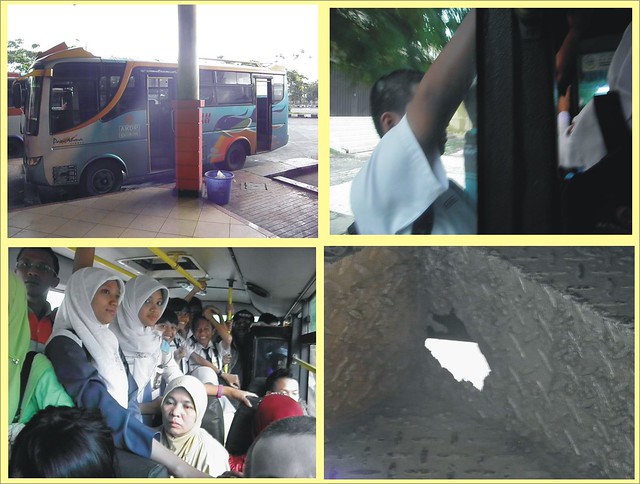
I would generally suggest avoiding these services if possible.
You should also note the vast majority of the local bus services allow buskers on. Most buskers are not especially good when it comes to singing, but a few can be very forceful when it comes to asking for money. A polite refusal is usually best and normally gets rid of them.
If you do give them cash, keep it to not more than Rp2,000 and never get large amounts of money out on these services.
NEVER get aggressive.
Horse and cart (No, I'm not joking)
Some of Jakarta's satellite towns still have these as working taxis, but most are just local rides for the kids.
In smaller towns they're still common forms of transport. You usually have to hammer out a price with the driver.
The horse and cart services were still operating as of December 2017
Go-jek and Grab bike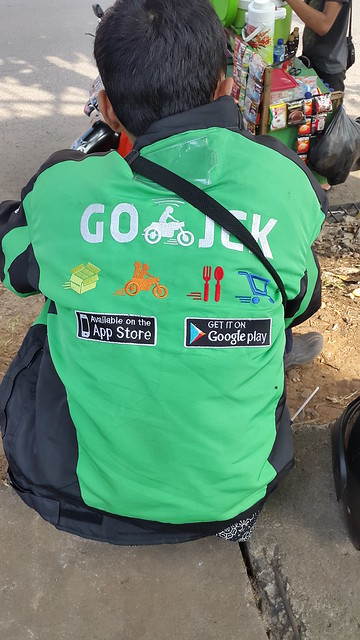
Go Jek and grab bike are motorcycle taxi services that use mobile apps to allow you to call transport to where ever your are.
The Go-jek and grab applications both ask for permission to use media, files, contacts lists and other private information.
I wouldn't advise installing any application that asks to access information they don't need to run their service.
Lukereg wrote:Hi GO-JEKERS!
Thank you for your never ending support for GO-JEK Indonesia. In an effort to give the very best services to our customers, new rates for GO-RIDE in JABODETABEK will be applied on December 29, 2015 at 00:00:
Rp. 12,000,- for 1-10 KM distance
Rp. 15,000,- for 10-15 KM distance
Rp. 2,000,-/KM for distance above 15 KM
With grab taxi you get sent emailed receipts and the choice of prices for different types of transport. Taxis for grab taxi include express and gamya.
Trains
Trains (Intercity)
You will be asked for identification for all long distance services.
The executive class intercity trains are generally clean and comfortable, but I have never enjoyed the food, so I would strongly suggest you take a packed lunch.
These services are being improved all the time, the latest being an executive class service with a layout you'd expect on the best airliner.
They're generally safe, but level crossings are a problem as many road users don't believe in stopping at them, even petrol tanker drivers.
Trains (Local around the Jakarta area)
You must buy a Rp10,000 card to use the trains, but that's refundable at the end of your journey if you wish to cash it in.
I don't have a full list of fares at this point, but I know West Jakarta to Bintaro costs Rp2,000.
The trains are fine when they're quiet, but you're packed in like sardines at rush hour, making them a little unsafe.
I've seen quite a few women faint because of the extremely cramped conditions, heat and lack of air.
All the local commuter trains are equipped with air conditioning and all have ladies only carriages.
There used to be non air conditioned economy trains, but these have all been retired from service now.
Many commuter stations are being upgraded at the moment, making life difficult for the moment, but the improvements will make things a lot better in the long run.
Commuterline info
http://www.krl.co.id
Airports / Air travel / airlines
Indonesian airlines used to have a terrible reputation and a worse accident record, but that's changed a lot over the last few years.
Garuda, the national carrier was banned in many countries (including the whole of the EU) but Garuda is now listed as a five star airline.
My personal experience forces me to agree with this without reservation. Their service has been fantastic, the staff are nothing short of great, and the in flight food is delicious (Tell me that isn't a major shock for any airline)
They gained awards for the most improved airlines and the world's best cabin crews. I can see why.
Lukereg wrote:For travellers leaving jakarta, old town coffee and Starbucks are both 24hours and are towards gates starting with D.
Security checks also require removing watches belts keys etc and they are cracking down on liquids and sharp things as well. There are far more bag searches and far more security personnel. The army, police both uniformed and plain clothed are there. Porters are not allowed to ask for tips anymore but I suspect they do.
There is also a move to changing the minimum arrival time to check in for flights due to the improved security checks but it hasnt started get.
Soekarno-Hatta is a clean, modern airport with good facilities for the traveller, including easily available food from Indonesian and western outlets.
Terminal two is international flights.
More information here.
http://soekarnohatta-airport.co.id/
As Luke mentions above, airport security is a major priority, so good behaviour at any airport is a very good idea.
You will be asked to remove laptops from your bag before it goes through the xray machines.
I really shouldn't have to mention this but I saw it myself last July, so it's probably worth a moment.
Don't turn up drunk and loud at any airport here. That would get you into trouble at most airports, but it will go down extremely badly here, leaving you with a fair chance of spending the night in a cell and having to rebook your flight.
The drunk I saw got away with it, but almost didn't after he tried to justify himself to me immediately after the serious telling off he'd just had from an immigration officer.
That almost finished his journey, but he realised it was best to accept my advice and shut up before he got himself arrested. Even after that he was still chuntering to himself.
All that because he tried to push into a queue ahead of a family, with no one behind them.
Very foolish.
I will also add a note of thanks to the staff at terminal 2, Soekarno-Hatta for their assistance with my elderly mother.
They went out of their way to be as helpful as possible, even escorting her through passport control when they saw she was having difficulty walking.
Their kindness is very much appreciated.
I wish to keep this thread as up to date as possible so, if you notice an error, want to add something, or feel something could use more detail, please PM.
I hope this thread helps you and saves you much of the messing around so many new expats have to endure.
Welcome to beautiful Indonesia.
.


